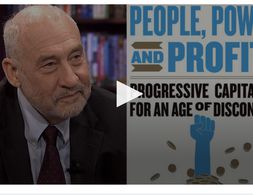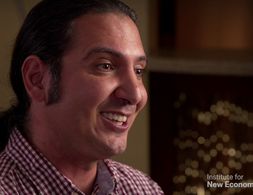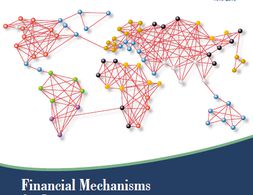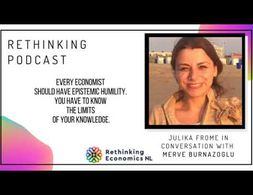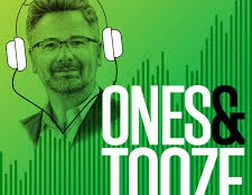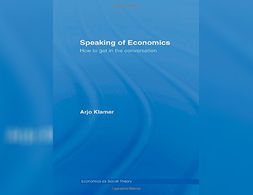✕
914 results
This content submission has two parts: (1) a link to the post by Wolf Richter on deterioration of US subprime credit card debt and loans, driven in part by the overuse of hedonic quality adjustments in the Consumer Price Index (CPI) used by the US Bureau of Labor Statistics, and (2) to introduce Exploring Economics to the website Naked Capitalism, which is an effort to promote critical thinking through the medium of a finance and economics blog and fearless commentary.
The authors discuss how identity affects economic outcomes by bringing together psychological and sociological perspectives and economics. For economic outcomes of a single individual, it might be interesting which kind of social groups this individual belongs to. This may influence individual daily decisions and hence economic outcomes. It can, however, not only affect individual economic outcomes but also economic outcomes of organizations, institutions and other groups. This paper describes these influences with respect to gender in the workplace, to the economics of poverty and social exclusion, and to the household division of labour.
In this tenth lecture in INET’s “How and How Not to Do Economics,” Robert Skidelsky argues that there are two main reasons why economists should study history.
In this podcast, Amy Goodman and Juan González explore together with Joseph Stiglitz, a Nobel Prize-winning economist, inequality and the state of the U.S. economy. Topics they touch upon are capitalism, taxation, powerlessness of citizens and Joseph Stiglitz's book entitled People, Power, and Profits: Progressive Capitalism for an Age of Discontent.
Exploring Economics Dossier on the economic fallout of the COVID-19 pandemic and the structural crisis of globalization. COVID-19 encounters a structural crisis of globalization and the economic system that drives it, with an uncertain outcome. We asked economists worldwide to share with us their analysis of current events, long-term perspectives and political responses. The dossier will be continuously expanded.
Economists claim they are not biased or ideological, but research by economist Mohsen Javdani tells another story. Javdani discovered that 82% of economists claim that statements and arguments should be evaluated on the content only, but the results of the study show the exact opposite.
In this short podcast, Naomi Fowler, the Tax Justice Network's creative strategist, discusses how the laws made by those who profited from slavery and the empire and, the extractive business models of the major financial sector continue to impoverish some of the poorest nations.
Most mainstream neoclassical economists completely failed to anticipate the crisis which broke in 2007 and 2008. There is however a long tradition of economic analysis which emphasises how growth in a capitalist economy leads to an accumulation of tensions and results in periodic crises. This paper first reviews the work of Karl Marx who was one of the first writers to incorporate an analysis of periodic crisis in his analysis of capitalist accumulation. The paper then considers the approach of various subsequent Marxian writers, most of whom locate periodic cyclical crises within the framework of longer-term phases of capitalist development, the most recent of which is generally seen as having begun in the 1980s. The paper also looks at the analyses of Thorstein Veblen and Wesley Claire Mitchell, two US institutionalist economists who stressed the role of finance and its contribution to generating periodic crises, and the Italian Circuitist writers who stress the problematic challenge of ensuring that bank advances to productive enterprises can successfully be repaid.
The principle of effective demand, and the claim of its validity for a monetary production economy in the short and in the long run, is the core of heterodox macroeconomics, as currently found in all the different strands of post-Keynesian economics (Fundamentalists, Kaleckians, Sraffians, Kaldorians, Institutionalists) and also in some strands of neo-Marxian economics, particularly in the monopoly capitalism and underconsumptionist school In this contribution, we will therefore outline the foundations of the principle of effective demand and its relationship with the respective notion of a capitalist or a monetary production economy in the works of Marx, Kalecki and Keynes. Then we will deal with heterodox short-run macroeconomics and it will provide a simple short-run model which is built on the principle of effective demand, as well as on distribution conflict between different social groups (or classes): rentiers, managers and workers. Finally, we will move to the long run and we will review the integration of the principle of effective demand into heterodox/post-Keynesian approaches towards distribution and growth.
The documentary features a talk of the US-American writer and economic theorist Jeremy Rifkin summarising the main points of his 2011 book "The Third Industrial Revolution."
In this one-on-one interview, co-host Gerardo Serra talks with Felwine Sarr, author of Afrotopia (2016) and professor of economics at Gaston Berger University in Senegal. Topics include the relevance (or lack thereof) of development economics to conditions in African economies, the significance of African philosophy for thinking about the economic problems of the continent, and the status of the field of history of economic thought in Africa.
This paper presents an overview of different models which explain financial crises, with the aim of understanding economic developments during and possibly after the Great Recession. In the first part approaches based on efficient markets and rational expectations hypotheses are analyzed, which however do not give any explanation for the occurrence of financial crises and thus cannot suggest any remedies for the present situation. A broad range of theoretical approaches analyzing financial crises from a medium term perspective is then discussed. Within this group we focused on the insights of Marx, Schumpeter, Wicksell, Hayek, Fisher, Keynes, Minsky, and Kindleberger. Subsequently the contributions of the Regulation School, the approach of Social Structures of Accumulation and Post-Keynesian approach, which focus on long-term developments and regime shifts in capitalist development, are presented. International approaches to finance and financial crises are integrated into the analyses. We address the issue of relevance of all these theories for the present crisis and draw some policy implications. The paper has the aim to find out to which extent the different approaches are able to explain the Great Recession, what visions they develop about future development of capitalism and to which extent these different approaches can be synthesized.
The current Great Recession, the worst crisis that capitalism has faced since the Great Depression, has failed, at least so far, to generate a change in the teaching and practice of Macroeconomics. This seems bizarre as if nothing has happened and the economists are just going about doing business as usual. In light of this, the current paper attempts to address how Macroeconomics ought to be taught to students at the advanced intermediate level, which gives them an overall perspective on the subject.
In this paper the main developments in post-Keynesian macroeconomics since the mid- 1990s will be reviewed. For this purpose the main differences between heterodox economics in general, including post-Keynesian economics, and orthodox economics will be reiterated and an overview over the strands of post-Keynesian economics, their commonalities and developments since the 1930s will be outlined. This will provide the grounds for touching upon three important areas of development and progress of post-Keynesian macroeconomics since the mid-1990s: first, the integration of distribution issues and distributional conflict into short- and long-run macroeconomics, both in theoretical and in empirical/applied works; second, the integrated analysis of money, finance and macroeconomics and its application to changing institutional and historical circumstances, like the process of financialisation; and third, the development of full-blown macroeconomic models, providing alternatives to the mainstream 'New Consensus Model' (NCM), and allowing to derive a full macroeconomic policy mix as a more convincing alternative to the one implied and proposed by the mainstream NCM, which has desperately failed in the face of the recent crises.
Central banking is anything but clear-cut. As this webinar with Benjamin Braun demonstrates, the standard view of central banks as independent public entities that govern financial markets and "print" money is at least partially misleading.
This report presents the results of the “Financial Mechanisms for Innovative Social and Solidarity Economy Ecosystems” project, designed to foster a better understanding of the different ways in which financial resources can be made available and accessed to support the growth of social and solidarity economy (SSE) organizations and their ecosystems. The project is supported by the Ministry of Labour, Employment and Social and Solidarity Economy of the Government of the Grand Duchy of Luxembourg.
Rethinking Economics NL explores every month together with a new host the field of economics from a different perspective.
Industrial policy has been a central part of policy prescription by many heterodox schools arguably since mercantilism, but the theories behind it and types of policy advocated for have evolved over time. Recently some neoclassical economists have shown renewed interest in it, but is this mainstream acceptance a step back or a step forward from earlier heterodox ideas?
Exploring Economics, an open-access e-learning platform, giving you the opportunity to discover & study a variety of economic theories, topics, and methods.
This short video visualizes the destabilizing effects financial markets can have on food prices, based on a paper by Jayati Ghosh. It introduces and explains the idea of future contracts and how those are used to speculate with basic food stuffs. After establishing the concepts, the video sketches out how the increase in those practices resulted in a substantial rise and later collapse of food prices around 2008 with severe consequences for many developing countries and their people.
This panel is about discussing the international development discipline from a critical perspective, exploring how the current practice entangles with Eurocentric/neo-colonial thoughts and how can we move beyond them.
The authors analyse the role and effects of the US dollar as factual global reserve currency. They demonstrate that a flight into the dollar creates adverse effects for the global economy as it represents a tightening of financial conditions.
"Alexander Kravchuk is an economist and editor at Commons: Journal for Social Criticims, who has previously written about IMF conditions on loans to Ukraine. Jacobin’s David Broder asked him about the country’s economic situation and why debt cancellation is important if Ukrainians are to be able to shape their future." (quote from the interview)
Western sanctions on Russia after its invasion of Ukraine quickly led the Ruble to lose more than 45 percent of its value. But these days, the Russian currency is back to its pre-war value. Cameron and Adam explain the turnaround and discuss what it means for the war.
The Atlas of Economic Complexity is an award-winning data visualization tool that allows people to explore global trade flows across markets, track these dynamics over time and discover new growth opportunities for every country.
"Energy issues have always been important in international relations, but in recent years may have become even more important than in the past due to the widespread awareness of existing limits to energy sources and negative climate impacts. The course discusses global trends in energy consumption and production, various available scenarios for potential developments in the coming decades, the availability of oil reserves and the evolution of the oil industry. It then discusses natural gas and highlights the differences between oil and gas. It will also discuss renewable energy sources, nuclear energy and EU energy policy.
The course aims at providing students whose main interest is in international relations a background on energy resources, technology and economic realities to allow them to correctly interpret the political impact of current developments. It also aims at providing students, who already have a technical background in energy science or engineering, with the broad global view of energy issues that will allow them to better understand the social, economic and political impact of their technical knowledge."
Information and skills required to make more sustainable choices every day.
This MOOC (Massive Open Online Course) discusses Global Workers’ Rights and shows instruments and strategies which can be used to implement them.
This course introduces the main topics in Econometrics by using R statistical software. The relation of themes is comprehensive and includes the basic notions such as linear regression, multiple regression, causal inference, regression discontinuity and instrumental variable. In total, the course covers thirteen chapters that are common in any undergraduate econometrics course.
Want to learn more about behavioural economics and its application to public policy? Take this free course from the Behavioural Economics Team of the Australian Government.
Making sense of economists and their world in a persuasive and entertaining style, Arjo Klamer, shows that economics is as much about how people interact as it is about the models, the mathematics, the econometrics, the theories and the ideas that come from the enormous aggregate of economics literature. Knowing and understanding economics requires both bookwork and mingling with other economists.
As the current economic crisis spreads around the globe questions are being asked about what king of capitalist or post-capitalist economy will follow. There is increasing talk of the need for stringent economic regulation, the need to temper greed and individualism, to make the economy work for human and social development.
We use cookies on our website. Click on Accept to help us to make Exploring Economics constantly better!




